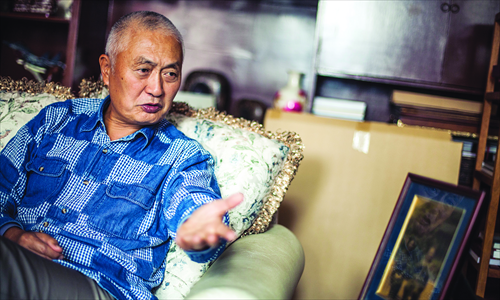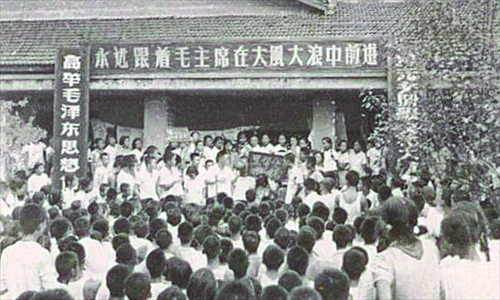A Red Guard’s warning

Former student leader Chen Xiaolu is still haunted by the suicide of a teacher abused by his Red Guards. Photo: Li Hao/GT
A high profile former Red Guard has publicly apologized for his role in bullying and humiliating teachers during the Cultural Revolution (1966-76), drawing the public into a debate over the legacy of Chairman Mao Zedong and the proper role of law in China's future path.
Chen Xiaolu told the Global Times he is still haunted by the image of teacher Hua Jin lying dead on the cement floor of a classroom in Beijing No.8 Middle School, where she hanged herself due to the barrage of abuse from the student Red Guards that he led.
On October 7, Chen publicly apologized to former teachers and staff at his alma mater who were tortured, persecuted or sent to labor camps during the time of social upheaval that marred Mao's chaotic last decade in power.
Chen's face-to-face apology to his teachers has attracted much attention and aroused heated discussion among the public due to his influential background as a "princeling" - the term given to descendants of prominent senior Party officials. Chen is the youngest son of People's Liberation Army Marshal Chen Yi, a national hero.
"I, as president of alumni association and head of the revolutionary committee, shoulder the responsibility of causing teachers to be humiliated, beaten and bullied during the Cultural Revolution. I express our remorse and apology for them. Everyone has to take their toll for their wrongdoings in the campaign," the silver-haired Chen, who is in his 60s, told the Global Times in his central Beijing courtyard.
Chen's apology is rippling through society. "It has represented a group of people who have a similar background as Chen and had the same doubts about the Cultural Revolution during and after the campaign," Lei Yi, a researcher on modern history from Chinese Academy of Social Sciences, told the Global Times.
Unexamined history
Chinese authorities long ago admitted in general terms that the Cultural Revolution was a disaster for China. However, there has not been much further self-examination, except rehabilitating names of the many officials and ordinary people who were unfairly harmed.
After the short appearance of "trauma literature" that reflected on the Cultural Revolution, there has been few books, movies or operas about the Cultural Revolution, and little nuanced discussion about it in the media.
In particular, there has not been an official reexamination of the role of Chairman Mao Zedong beyond the formulation that Mao was 70 percent correct and 30 percent wrong.
An official Communist Party of China document issued in 1981 admitted that the Cultural Revolution was a "serious mistake," but many people, especially liberals, believe there has not been enough introspection about the decade that saw mass destruction of cultural relics, economic stagnation, and the stigmatization of educated people. A long-anticipated national Cultural Revolution memorial has never been realized.
Chen and others are worried the tide of the Cultural Revolution might rise again if the disastrous mistakes are not fully recognized and rectified.
For Chen, the biggest mistake of the era and main cause of the chaos was a lack of respect for the rule of law. "After 47 years, I eventually understand that people's dignity and rights are protected by the Constitution. I had no idea about it during that time." Chen said the whole society should enhance its legal education and include lessons on institutional law in primary and middle schools.

Students criticizing teachers at the Beijing No.8 Middle School during the Cultural Revolution. Photo: Courtesy of Huang Jian
Bad memories
More than 40 years ago, at the height of Cultural Revolution that swept all across China, leaders, teachers and revered intellectuals were humiliated, accused of being counter-revolutionary, and beaten by gangs of young people calling themselves Red Guards for Chairman Mao. Some of the victims committed suicide, others died from ill treatment. Students in the Beijing No.8 Middle School rose up and launched a violent crackdown on teachers. One third of the school's students were children of Party officials.
Partly because of his prominent father, Chen was a household name during the campaign.
At first, criticism of teachers was confined to oral abuse. But the situation worsened, and attacks became more severe.
Teacher Hua Jin, the school's Party secretary, hanged herself in a classroom, telling one person, "I can no longer stand it" before she ended her life.
"The death of Hua and other teachers wavered my resolution [to support the Cultural Revolution]. I began to think there must be something wrong with it," Chen told the Global Times.
A campaign of violence under the name "reprimanding the black gang figures" also spurred Chen to rethink the Cultural Revolution. Amid this campaign, Bian Zhongyun, the Party secretary of the Female Middle School affiliated with Beijing Normal University, was beaten to death.
Chen said that in response, he organized a team to supervise the young Red Guards' behavior and stop violence.
He recalls that almost all the people who watched teachers and students being treated violently chose to act indifferently. "They were under pressure. They had to draw a line between themselves and their enemies," Chen said.
The apology
Even the most pugnacious students who once beat their teachers have long ago already repeatedly apologized to their teachers privately. However, Chen, as president of the alumni, insisted that he and his schoolmates owe teachers "a public and official apology."
"Teachers are getting older and older. They will depart from the world someday soon. It is time for us to do something," said Chen. He said the "apology is to purify souls."
In May, schoolmate Ji Sanmeng, a media professional in contact with all the teachers, called Chen and expressed the same thought on giving a public apology. Chen decided he should not wait, and wrote a letter to Huang Jian, general secretary of alumni, proposing he, as a representative, write a letter to express his apology, gratitude and blessings.
After Chen's apology was posted on the Internet, the gathering soon turned into a public event.
Huang said the massive attention on the gathering reduced its scale. "We had planned to invite students in our school and some current leaders to participate. However, it was inconvenient for them to show up after receiving strong feedback from society." In the end, only nine teachers older than 70 and a dozen of alumni attended the gathering for the apology, on October 7.
The gathering was held under an atmosphere of forgiveness.
"We never blamed you for criticizing me. You are victims too. Back in the old days, the core of traditional socialism was based on class struggle. Who dared not to support it?" Zhang Xianchuan, the oldest teacher at the meeting, told China Youth Daily.
Self-examination
Some historians see Chen's apology as significant, because it relates not just to the distant past, but also to today.
Lei Yi of the Chinese Academy of Social Sciences told the Global Times, "In a society where we have seen a rising sentiment of beautifying or downplaying the negative effects of the Cultural Revolution, Chen's apology is important. It can trigger people's reflection on that history."
Tang Jianguang, the former chief editor of National History, a popular historical periodical, told the Global Times, "Both the government and people avoid talking about the issue in public or via media."
Tang said he encountered some people who once abused others during the height of the chaos who wish to seek redemption by publishing their apology in the media. But they have not been able to do it, because the topic is still sensitive.
Tang said this lack of reflection might pose a threat to the hard-won establishment and development of a legal system and democracy.
Chen's apology comes after a life sentence given to former Party member Bo Xilai on charges of corruption and abuse of power. Prior to his fall from grace, Bo was known for leading populist campaigns by promoting Maoist nostalgia when he was Party chief of Chongqing.
"The core of the Chongqing campaigns - using political methods to solve economic and legal problems - is a remnant of the Cultural Revolution, which trampled the dignity of the law," Tang said.
Chen's apology renewed a public debate over how far criticism of Cultural Revolution should go. It sparked a heated public reaction, with most people praising what he did for his courage and righteousness. However, Chen was also criticized for not going deep enough in reviewing the Cultural Revolution.
"This kind of rethinking still stops on the level of humanity, and seldom targets the real cause of the tragedy," wrote Qin Peng, an active online commentator.
Chen had these very issues in mind when he issued his public apology.
"Will the Cultural Revolution come back?" Chen asked rhetorically.
"The core of Cultural Revolution is ruthlessness and tyranny. Now, the whole society is still full of the negative power. For youngsters who beat owners of Japanese-branded cars, do they realize their behaviors are remnants from the Cultural Revolution?"
Chen told the Global Times, "The country and nation needs a correct attitude toward the Cultural Revolution, to corral society into the right orbit again."